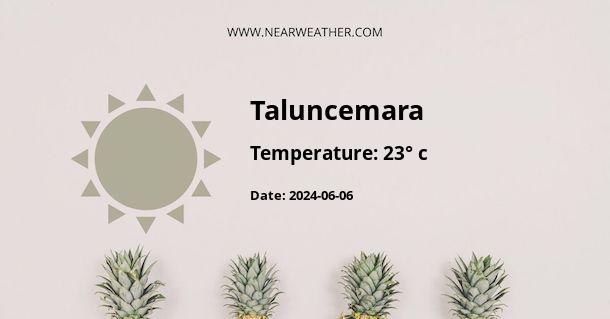Taluncemara, ID: Weather and Climate Overview
Taluncemara, ID, located in the southern region of Idaho, is known for its diverse climate and variety of weather patterns throughout the year. Understanding the weather and climate of Taluncemara is essential for residents, tourists, and businesses operating in the area. This comprehensive guide provides detailed insights into Taluncemara's weather, climate patterns, and seasonal variations.
Climate of Taluncemara, ID
The climate of Taluncemara can be classified as a semi-arid climate, characterized by hot, dry summers and cold winters. The region experiences relatively low precipitation and is known for its wide temperature differentials between day and night.
The Köppen climate classification for Taluncemara, ID, is predominantly categorized as "BSk," signifying a cold semi-arid climate. The "B" represents the arid climate, while "Sk" specifies the cold steppe climate subtype. This classification indicates that the region experiences arid conditions with relatively low annual precipitation and significant temperature variations.
Annual Weather Patterns
Understanding the annual weather patterns in Taluncemara is crucial for individuals and businesses planning outdoor activities, agricultural operations, and resource management. The following table provides an overview of the average monthly temperature and precipitation in Taluncemara, ID.
| Month | Average Temperature (Fahrenheit) | Precipitation (Inches) |
|---|---|---|
| January | 28.5 | 2.1 |
| February | 33.7 | 1.8 |
| March | 42.6 | 1.9 |
| April | 54.3 | 1.2 |
| May | 64.8 | 1.2 |
| June | 74.6 | 0.7 |
| July | 82.5 | 0.3 |
| August | 80.6 | 0.4 |
| September | 70.1 | 0.7 |
| October | 56.2 | 1.0 |
| November | 41.2 | 1.6 |
| December | 30.1 | 2.0 |
From the table, it is evident that Taluncemara experiences a wide range of temperatures throughout the year, with the hottest month being July and the coldest month being January. Additionally, the precipitation levels remain relatively low across the months, with a slight increase during the spring and fall seasons.
Seasonal Variations
Each season in Taluncemara brings unique weather patterns and environmental changes. Understanding the seasonal variations is essential for planning outdoor activities, agricultural cycles, and infrastructure maintenance. The following section outlines the distinct characteristics of each season in Taluncemara, ID.
Spring (March - May)
Spring in Taluncemara marks the transition from the colder winter months to the warmer temperatures of summer. The region experiences moderate temperatures during the day, with occasional precipitation that supports the growth of vegetation and agricultural activities.
Summer (June - August)
Summer in Taluncemara is characterized by hot, dry weather with long daylight hours. The temperatures can soar during the day, necessitating measures to stay hydrated and cool. This season is ideal for outdoor recreational activities and tourism, although precautions should be taken to avoid heat-related illnesses.
Fall (September - November)
During fall, Taluncemara experiences gradual cooling temperatures and occasional precipitation. The landscape transforms with vibrant autumn colors, making it an attractive season for nature enthusiasts and photographers. Agricultural harvests and outdoor events are prevalent during this time.
Winter (December - February)
Winter in Taluncemara brings cold temperatures and occasional snowfall. The region experiences a decrease in outdoor activities, with a focus on winter sports and indoor gatherings. It is essential to prepare for the winter conditions by ensuring proper insulation and safety measures for snow and ice.
Extreme Weather Events
While Taluncemara generally experiences a semi-arid climate, it is susceptible to occasional extreme weather events such as thunderstorms, high winds, and rare instances of heavy snowfall. Understanding the potential for these events is crucial for emergency preparedness and infrastructure resilience.
According to historical weather data, Taluncemara has experienced notable extreme weather events, including rare blizzards in winter and isolated severe thunderstorms in summer. Monitoring local weather forecasts and staying informed about emergency protocols can mitigate the impact of these events.
Conclusion
The weather and climate of Taluncemara, ID, exhibit distinct seasonal variations and a semi-arid climate, impacting various aspects of daily life, agriculture, tourism, and infrastructure. By understanding the annual weather patterns, seasonal variations, and potential for extreme weather events, individuals and businesses can make informed decisions to enhance safety, productivity, and overall well-being in the region.
For further information on weather forecasts and specific climate-related inquiries, consulting local meteorological services and environmental agencies is recommended.
A - Taluncemara's Latitude is -7.219600 & Longitude is 107.907799.
A - Weather in Taluncemara is 22° today.
A - Climate Conditions in Taluncemara shows moderate rain today.
A - Humidity in Taluncemara is 92% today.
A - Wind speed in Taluncemara is 3.96 km/h, flowing at 215° wind direction. today.
